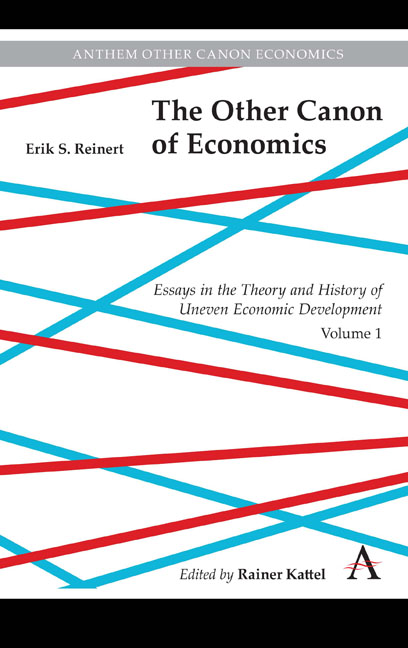Book contents
- Frontmatter
- Dedication
- Contents
- Introduction
- Chapter 1 Catching-up from Way Behind. A Third World Perspective on First World History
- Chapter 2 Recent Trends in Economic Theory — Implications for Development Geography
- Chapter 3 A Schumpeterian Theory of Underdevelopment - A Contradiction in Terms?
- Chapter 4 Competitiveness and Its Predecessors - A 500-Year Cross-national Perspective
- Chapter 5 Diminishing Returns and Economic Sustainability: The Dilemma of Resource-based Economies under a Free Trade Regime
- Chapter 6 Economics: ‘The Dismal Science’ or ‘The Never-ending Frontier of Knowledge’? On Technology, Energy and Economic Welfare
- Chapter 7 Production Capitalism vs. Financial Capitalism – Symbiosis and Parasitism. An Evolutionary Perspective and Bibliography
- Chapter 8 Globalization in the Periphery as a Morgenthau Plan: The Underdevelopment of Mongolia in the 1990s
- Chapter 9 Increasing Poverty in a Globalized World: Marshall Plans and Morgenthau Plans as Mechanisms of Polarization of World Incomes
- Chapter 10 An Early National Innovation System: The Case of Antonio Serra’s 1613 Breve Trattato
- Chapter 11 Innovation Systems of the Past: Modern Nation-States in a Historical Perspective. The Role of Innovations and of Systemic Effects in Economic Thought and Policy
- Chapter 12 The Other Canon: The History of Renaissance Economics
- Chapter 13 Benchmarking Success: The Dutch Republic (1500–1750) as Seen by Contemporary European Economists
- Chapter 14 Mercantilism and Economic Development: Schumpeterian Dynamics, Institution Building and International Benchmarking
- Chapter 15 Development and Social Goals: Balancing Aid and Development to Prevent ‘Welfare Colonialism’
Chapter 7 - Production Capitalism vs. Financial Capitalism – Symbiosis and Parasitism. An Evolutionary Perspective and Bibliography
Published online by Cambridge University Press: 13 April 2024
- Frontmatter
- Dedication
- Contents
- Introduction
- Chapter 1 Catching-up from Way Behind. A Third World Perspective on First World History
- Chapter 2 Recent Trends in Economic Theory — Implications for Development Geography
- Chapter 3 A Schumpeterian Theory of Underdevelopment - A Contradiction in Terms?
- Chapter 4 Competitiveness and Its Predecessors - A 500-Year Cross-national Perspective
- Chapter 5 Diminishing Returns and Economic Sustainability: The Dilemma of Resource-based Economies under a Free Trade Regime
- Chapter 6 Economics: ‘The Dismal Science’ or ‘The Never-ending Frontier of Knowledge’? On Technology, Energy and Economic Welfare
- Chapter 7 Production Capitalism vs. Financial Capitalism – Symbiosis and Parasitism. An Evolutionary Perspective and Bibliography
- Chapter 8 Globalization in the Periphery as a Morgenthau Plan: The Underdevelopment of Mongolia in the 1990s
- Chapter 9 Increasing Poverty in a Globalized World: Marshall Plans and Morgenthau Plans as Mechanisms of Polarization of World Incomes
- Chapter 10 An Early National Innovation System: The Case of Antonio Serra’s 1613 Breve Trattato
- Chapter 11 Innovation Systems of the Past: Modern Nation-States in a Historical Perspective. The Role of Innovations and of Systemic Effects in Economic Thought and Policy
- Chapter 12 The Other Canon: The History of Renaissance Economics
- Chapter 13 Benchmarking Success: The Dutch Republic (1500–1750) as Seen by Contemporary European Economists
- Chapter 14 Mercantilism and Economic Development: Schumpeterian Dynamics, Institution Building and International Benchmarking
- Chapter 15 Development and Social Goals: Balancing Aid and Development to Prevent ‘Welfare Colonialism’
Summary
This chapter presents a note and an extensive bibliography on the relationship between production capitalism and financial capitalism. The document was produced for a conference held at Leangkollen outside Oslo on 3–4 September 1998. The background for the conference was the Asian financial crisis that started in July 1997. The massive Russian financial crisis had started a few days before the conference, on 17 August 1998, and the Russian participant, Professor Vladimir Avtonomov, brought fresh news from these dramatic events.
The global financial crisis that started in 2008 – ten years after this conference – vindicated the perspectives presented here, and prompted the wish to make the note and the very extensive bibliography of relevant, but mostly forgotten, literature on the relationship between the production sector and the monetary sector of the economy. The conference programme is found at the end of the chapter.
Financial issues are far from being at the core of evolutionary economics. The evolutionary focus has been on the production of goods and services (on what Schumpeter called the Güterwelt), not on money. This has, no doubt, been the right emphasis, particularly as much of our economic policy – both in the First and in the Third World – is still based on what Schumpeter called ‘the pedestrian view that it is capital per se which propels the capitalist engine’. The view of evolutionary economics on finance has tended to be in line with what the same author, Schumpeter, saw as one conclusion from Antonio Serra's 1613 book: ‘If the economic process as a whole functions properly, the monetary element will take care of itself and not require any specific therapy.’ However, in the context of the late 1990s, the financial system seems to intrude into the economic process in a way that is qualitatively different from before. This, we feel, raises the need to discuss the relationship between evolutionary economics and finance.
Traditionally, evolutionary economics deals with the dynamics within the black box of production (the Güterwelt). The dynamics of the Güterwelt require, however, a financial scaffolding in order to develop. At the best of times, then, there is a healthy symbiosis between the two worlds, between the real economy and the financial economy.
- Type
- Chapter
- Information
- The Other Canon of EconomicsEssays in the Theory and History of Uneven Economic Development, pp. 157 - 214Publisher: Anthem PressPrint publication year: 2024

